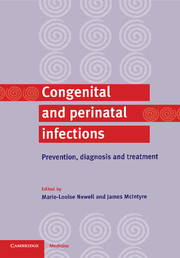Book contents
- Frontmatter
- Contents
- List of contributors
- Preface
- Part I General issues
- Part II Specific infections
- 5 Rubella infection in pregnancy
- 6 Perinatal Group B streptococcal infections
- 7 Mother-to-child transmission of cytomegalovirus
- 8 Varicella
- 9 Herpes simplex
- 10 Vertical transmission of hepatitis viruses
- 11 Papillomavirus infections as a perinatal problem: diagnosis, prevention and management
- 12 HIV-1 infection
- 13 Syphilis: prevention, diagnosis and management during pregnancy and infancy
- 14 The other sexually transmitted diseases
- 15 Toxoplasmosis
- 16 Neonatal sepsis
- Index
5 - Rubella infection in pregnancy
Published online by Cambridge University Press: 06 July 2010
- Frontmatter
- Contents
- List of contributors
- Preface
- Part I General issues
- Part II Specific infections
- 5 Rubella infection in pregnancy
- 6 Perinatal Group B streptococcal infections
- 7 Mother-to-child transmission of cytomegalovirus
- 8 Varicella
- 9 Herpes simplex
- 10 Vertical transmission of hepatitis viruses
- 11 Papillomavirus infections as a perinatal problem: diagnosis, prevention and management
- 12 HIV-1 infection
- 13 Syphilis: prevention, diagnosis and management during pregnancy and infancy
- 14 The other sexually transmitted diseases
- 15 Toxoplasmosis
- 16 Neonatal sepsis
- Index
Summary
Introduction
Rubella virus belongs to the rubivirus genus of the family Togaviridae, for which humans are apparently the only host. Rubella is an enveloped single-stranded RNA virus which is relatively fragile, multiplies in and is transmitted from the respiratory tract of infected individuals. The virus gains access to the bloodstream resulting in widespread dissemination throughout the body. In pregnant women, rubella can infect the placenta leading to fetal infection with varying degrees of fetal damage. Attention was first drawn to the association between rubella and fetal damage when Gregg, an Australian ophthalmologist noted an epidemic of congenital cataracts following a large outbreak of rubella (Gregg, 1941). Similar reports followed from Sweden, the US and the UK and the role of rubella in congenital cataracts was confirmed. The coincidence of heart disease and deafness was also noted (Plotkin & Mortimer, 1994). Rubella infection is often asymptomatic or causes only mild disease, and the importance is confined to infection during pregnancy and its possible effects on the fetus, referred to as the congenital rubella syndrome (CRS).
Rubella infection is readily prevented by a highly effective and safe live attenuated vaccine which when given to all infants and susceptible adults, as is the case in much of the developed world, has virtually eliminated cases of the congenital rubella syndrome. However, rubella can still be prevalent in immigrant populations from countries where vaccination is not common (Tookey & Peckham, 1999).
Clinical features of rubella
In children rubella infection is usually either asymptomatic or with mild constitutional symptoms accompanied by an evanescent rash, which is often missed. In adults, infection is generally accompanied by an illness although this is likely to be mild.
- Type
- Chapter
- Information
- Congenital and Perinatal InfectionsPrevention, Diagnosis and Treatment, pp. 83 - 95Publisher: Cambridge University PressPrint publication year: 2000



